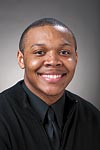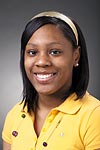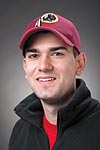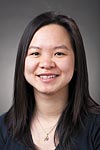Gates scholars overcome obstacles, settle into campus
When most people think of Bill Gates, they think computers. But when UW–Madison’s 14 Gates Millennium Scholars think of the renowned computer genius, they are probably reminded of their own promising futures.
The Gates Millennium Scholars Program (GMS) was founded in 1999 with a grant from the Bill and Melinda Gates Foundation.
The program provides scholarships to minority students with financial need. The scholarships fund the entire cost of undergraduate education minus the family’s expected contribution based on each family’s individual income.
GMS covers the cost of attendance, which is estimated for each individual scholar, and includes tuition, housing, school supplies and other basic necessities.
Scholars who pursue graduate studies in computer science, education, engineering, library science, mathematics, public health or science will receive funding for graduate school.
The program has funded more than 12,000 scholars from all 50 states since its inception in 1999 and selects approximately 1,000 new scholars every year. More than 1,500 colleges and universities nationwide enroll GMS students. UW–Madison currently enrolls 14.

Peterson
When the high school seniors get word of their acceptance into GMS, a world of possibilities opens up to them, and they can have their choice of any school they’ve been admitted to, as money is no longer a limiting factor. So what attracted UW–Madison’s GMS students to Wisconsin?
“I could come here and not feel like I was here by myself,” says freshman and GMS student Latreal Peterson, who intends to major in communications, and who first visited the campus over the summer during high school as part of his Museum of Science and Industry internship program. “I had met some of the staff over the summer and they were so welcoming and just changed my whole perspective of college and really inspired me to come.”

Hunt
Like Peterson, pre-pharmacy freshman Martia Hunt fell in love with the school when she visited during a high school summer as a Pre-College Enrichment Opportunity Program for Learning Excellence (PEOPLE) student and met with UW–Madison students. “Just seeing them, that motivated me to come here,” she says. “I love the campus and just decided that this was my dream school.”
Other GMS students, such as sophomore Krishna Patel and junior Sergio Romero, found more specific reasons to enroll at UW–Madison.“There’s such a political life here,” Patel, a biology and political science major with a pre-med intention, says. “That’s something I just thrive off of.” Patel adds that she was looking forward to campaigning for Obama in the state’s capital city for the 2008 elections, during which she was a member of Students for Obama. She also is a member of UW–Madison’s chapter of Health Occupations Students of America.

Romero
Romero, who is double-majoring in Chinese and economics, originally chose UW–Madison for its notable rowing team, but was intrigued by the diverse opportunities that he found once he started school. “Once I actually got here I found out it had a lot more to offer,” he says. “So what attracted me to actually stay here once I was no longer rowing was just the fact that it’s so big and there are so many options as to what you want to do.” Romero was sure to take advantage of all the university had to offer. He is a past president and current member of Zeta Psi and is a house fellow in Ogg Hall.
The three criteria GMS uses to choose their scholars are academic achievement, community service and leadership. The scholars are quick to get involved in student life.
Pharmacology Ph.D. student Uyen Chu volunteers in the oncology unit of the American Family Children’s Hospital.

Patel
Last semester, Peterson enrolled in a first-year interest group, during which he helped organize a Christmas banquet for children whose parents were incarcerated as part of a Madison-area Urban Ministry mentorship program. He recently accepted a diversity education job for the Multicultural Student Coalition.
Freshman Precious Woodley, a PEOPLE student majoring in human development and family studies and psychology, is involved in the Wisconsin Black Student Union, Gospel Choir, Living Water Praise Dancers and the Impact Movement. She is also a GMS freshman ambassador, which requires her to spread the word about the scholarship to high school students.
It’s not hard to rave about the program when GMS takes such a personal interest in each of its scholars. “They’ll e-mail you at the end of the semester, the middle of the semester, just to check up on you,” Patel says. “You can spill your heart out, and any problem you might have with school and they will listen, they will reply back. They will give you ideas and people to contact and just to help you succeed.”

Chu
Peterson agrees that GMS works to connect with its scholars. “It’s not just a scholarship that gives you money,” he says. “It’s a scholarship that provides a support system that … guides you, gives you steps where you can succeed and places people in your life that will help you succeed.”
About a month into the scholars’ freshman year, GMS invites all the first-year scholars to a leadership conference. “It was just a chance to meet people in the same position as you—coming in from high school struggles, but they made it through,” Peterson says.
Hunt agrees. “A lot of other students there were from campuses that were primarily white, so just to hear their stories and that they related to me, it motivated me to stay where I was at, and it was also comforting,” she says.
Patel also enjoyed meeting other GMS students. “You just hear so many stories that you think are impossible, that you think really aren’t imaginable, and people go through them,” she says. “They survive, and look where they end up.”
Peterson adds that the conference also prepared students for their future. “It was professional at the same time. They gave us business cards,” he says. “I think it kind of set you up for the real world in a sense, dealing with meetings and presentation skills.”
But no matter where they’re going, the GMS students will never forget where they came from. “Growing up in an urban environment, I’ve had to see a lot of people struggle,” Hunt says. “My mother had to struggle, and seeing that struggle pushed me even harder to do well in school and to do well in everything I do so I know that one day I’ll be able to help them out.”
Patel’s parents emigrated from India in 1984. “They came here with $20 in their pocket and had to find a job, had to work, had to bring their way up and they did it all for a better life for me,” she says. “Just growing up in that kind of atmosphere, knowing you have support there no matter what, people just want to see you succeed.”
Chu and her parents also were immigrants to the United States. “My parents never had a chance to go to school over there,” she says. “[Minority scholarships] are very important for those who have the ability but can’t afford to go to these kinds of schools.”
Hunt agrees. “We need these scholarships to promote diversity, to give these children in situations they can’t control … better opportunities, better education for them to actually do something with their lives and not continues the cycle with their children,” she says.
Romero adds that minority scholarships don’t just benefit the recipients, but they also add to the strength of higher education “To have a great university, you have to have a lot of different minds coming together from a lot of different backgrounds,” she says. “Not only does it make it diverse, it makes it a better university where you can actually sift through a lot of [different perspectives].”
Peterson agrees. “When you look at certain fields of education or just certain professions, it’s the majority that dominates,” he says. “We need minorities in office, we need minorities in higher education.”
Romero also feels that as a GMS scholar, he is responsible for dispelling stereotypes of Hispanics. “I feel like when people think Hispanic, I want them to think me,” he says. “I want them to think Sergio Romero. I don’t want them to think some drug organization out in L.A. I feel like I’m promoting an image, and with that image comes not only acceptance but real belief and value of this group.”
Peterson also believes that minority scholarships are crucial in creating examples of successful minorities to motivate upcoming generations. “They expect us to do great things here on campus, but when we graduate, not just to go about our business but at the same time to take it back to our communities,” he says.
Tags: audio, diversity, student awards




